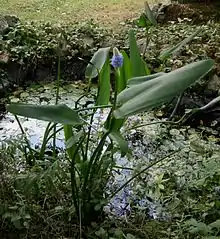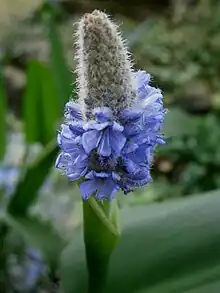| Pontederia sagittata | |
|---|---|
 | |
| Scientific classification | |
| Kingdom: | Plantae |
| Clade: | Tracheophytes |
| Clade: | Angiosperms |
| Clade: | Monocots |
| Clade: | Commelinids |
| Order: | Commelinales |
| Family: | Pontederiaceae |
| Genus: | Pontederia |
| Species: | P. sagittata |
| Binomial name | |
| Pontederia sagittata | |
| Synonyms[1] | |
| |
Pontederia sagittata is a species of aquatic plant belonging to the family Pontederiaceae.[1]
Description
It is a perennial plant with erect, rhizomatous tough stems. Basal leaves, emerging; pods 10–27 cm, the apex emarginate; petioles up to 1 m, not inflated, sometimes reddish; Blades 8-32 x 5–19 cm, lanceolate, the base cordate, the apex acute. Inflorescence with more than 50 flowers; flowers arranged in groups of 3, 4 or more along the peduncle, sessile; peduncle (6-)10-20(-22) cm, thick, hairy to hairy or rarely glabrous; internode between spathes (3.5-)5-16(-20) cm; blade of lower spathe 8-32 x 5–19 cm; upper spathe (3-)4-7(-9) cm, open on the upper 1/2, the apex mucronulate. 1.5 cm flowers. Perianth lilac or rarely white, externally hairy-glandular; outer lobes c. 6mm; internal lobes c. 6mm Long filaments 6–9 mm, with glandular hairs in the upper 1/3, short ones 0.7-3.5 mm, with glandular hairs in the upper 1/3; anthers of upper whorl 0.75–1 mm, yellow; anthers of lower whorl 0.55-0.85 mm, yellow. Pistil 3–6 mm; style hairy towards apex; stigma 3-lobed. Utricles 5–6 mm, deltiform, with smooth rib edges; seeds 2.3-2.5 mm, smooth, obovoid, covered by a mucilaginous layer with an oily appearance.

Taxonomy
Pontederia sagittata was first described by Carl Presl in 1827. It has sometimes been reduced to a form or variety of Pontederia cordata.[1]
Distribution and habitat
Pontederia sagittata has a discontinuous distribution, being native from Mexico to Central America and then eastern and southern Brazil.[1] It is found on the edges of rivers, lagoons, ponds, and swamps,[2] at altitudes of up to 1,500 m (4,900 ft).
References
- 1 2 3 4 "Pontederia sagittata C.Presl". Plants of the World Online. Royal Botanic Gardens, Kew. Retrieved 2024-01-11.
- ↑ T (Novelo 187, BM); Ch (Breedlove 29040, DUKE); Y (Lot and Novelo 880, MEXU); G (Lundell 1445, MICH); H (Barkley and Hernández 40443, GH); CR (Pittier 10301, US); P (Croat 9832, MO).